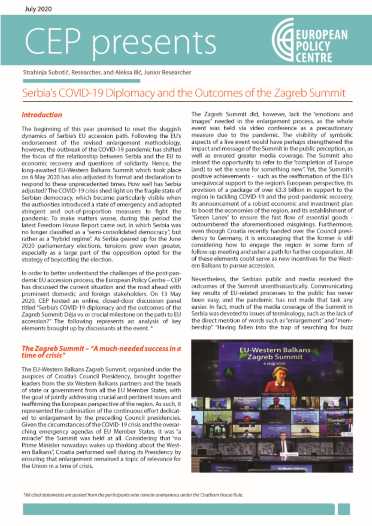Serbia’s COVID-19 Diplomacy and the Outcomes of the Zagreb Summit
Serbia’s COVID-19 Diplomacy and the Outcomes of the Zagreb Summit
Author(s): Strahinja Subotić, Aleksa Ilić
Subject(s): Politics, Security and defense, Health and medicine and law, EU-Approach / EU-Accession / EU-Development
Published by: Centar za evropske politike CEP
Keywords: COVID-19; Serbia; diplomacy; Zagreb summit; outcomes;
Summary/Abstract: The beginning of this year promised to reset the sluggish dynamics of Serbia’s EU accession path. Following the EU’s endorsement of the revised enlargement methodology, however, the outbreak of the COVID-19 pandemic has shifted the focus of the relationship between Serbia and the EU to economic recovery and questions of solidarity. Hence, the long-awaited EU-Western Balkans Summit which took place on 6 May 2020 has also adjusted its format and declaration to respond to these unprecedented times. How well has Serbia adjusted? The COVID-19 crisis shed light on the fragile state of Serbian democracy, which became particularly visible when the authorities introduced a state of emergency and adopted stringent and out-of-proportion measures toght the pandemic. To make matters worse, during this period the latest Freedom House Report came out, in which Serbia was no longer classied as a “semi-consolidated democracy”, but rather as a “hybrid regime”. As Serbia geared up for the June 2020 parliamentary elections, tensions grew even greater, especially as a large part of the opposition opted for the strategy of boycotting the election.
Series: Centar za evropske politike - PRESENTS
- Page Count: 3
- Publication Year: 2020
- Language: English
- Content File-PDF
- Introduction

